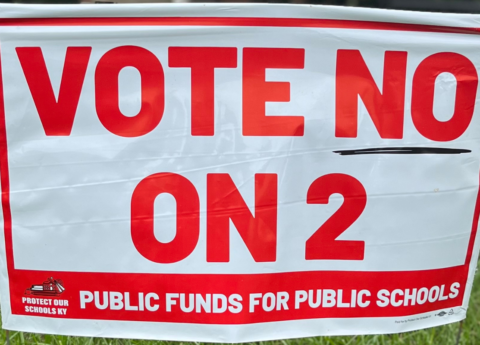Over the next couple months, the 2021 Kentucky General Assembly will decide whether to enact House Bill 149, a private school voucher program that between now and 2040 would take $8.6 billion away from public schools and other critical investments and hand over control of those resources to unaccountable private entities.
The loss of public resources would come at a critical time for Kentucky’s P-12 classrooms. After more than a decade of state budget cuts set in motion by the Great Recession, per-pupil core school funding is already 16% below 2008 levels, afterschool programs have been cut nearly 40% and Family Resource and Youth Service Center funding is down nearly 15%. The resulting increased reliance on local revenue is brewing a crisis the state Supreme Court declared unconstitutional in the 1989 Rose Decision: In 2019, state and local funding for students in the wealthiest districts was $2,840 more than funding for students in the poorest districts.
A new, expensive private school voucher would deeply exacerbate these problems. HB 149 (SB 25 in the Senate) would create a new tax break that drains a continuously expanding pot of monies from the state’s General Fund budget. By 2031, when second graders this year graduate from high school, it would have already diverted over $1 billion to private schools and organizations — resources that would otherwise be available to invest in high-quality, publicly accountable preschool, K-12 classrooms and community colleges. And the revenue hole will keep growing.
HB 149 would give these resources to third party entities to pay for private school tuition and fees, uniforms and college test preparatory courses. These entities could reserve up to 10% of funding for administrative expenses, accumulate a large, growing carryforward and contract with “private financial management firms or other organizations.” In 2040, when the annual cost of HB 149 is $1.7 billion, Kentucky will spend $170 million on these wasteful administrative intermediaries, money that could instead be used to ensure public schools have enough counselors, classroom aids and speech pathologists, for example.
The most efficient and equitable way to invest state tax dollars in our children’s education is to adequately fund Kentucky’s public schools. It is also a constitutional mandate. Direct public spending on private schools through vouchers is prohibited by Kentucky’s constitution. HB 149 is a voucher at its core, but uses the tax code as a loophole to get around this prohibition.
The tax break itself — between 95 and 97 cents for every dollar donated to the voucher program — would be the richest in Kentucky by far. It’s 19 times bigger than the state’s charitable deduction for other kinds of giving to nonprofits such as places of worship, animal shelters and food banks (and which nonprofit private schools already benefit from). A tax credit of this size effectively allows private individuals and corporations to direct state tax dollars according to their preference.
If “donors” give stocks that have appreciated in value, they will actually make money on the tax break by avoiding capital gains taxes. In other words, HB 149 pays stock market investors to divert public resources to private entities.
Despite what we’ve heard about the equity goals of programs like these, the experiences of other states show that HB 149 will primarily benefit the most well-off families that are eligible. Students only become ineligible once their household income surpasses 463% of poverty — up to $121,175 for a household of 4. This means that many families who are already paying for and can afford private school, costs related to homeschooling or other alternatives will be eligible for the state to pick up these costs.
On the other hand, accessing the program will be more difficult for low-income working parents and those without reliable internet, cell phone service, transportation and access to educational alternatives. Few such alternatives even exist in Kentucky’s rural counties. Research suggests that contemporary voucher programs can even worsen racial and socioeconomic stratification. And under HB 149, public resources would be diverted to private settings where students may be discriminated against based on gender identity, sexual orientation, being an English language learner, race, disability status and religion.
Kentucky already has a proven way to advance equity and academic success: by systematically investing more in low-income districts, as has been and would be done by increasing the state’s General Fund contribution to core school funding, and in programs providing special support for disadvantaged students. We have a lot of work to do to equip every child to thrive and remove all barriers to success. HB 149 would make that crucial task much harder.
This column ran in the Hopkinsville Kentucky New Era on January 29 and the Northern Kentucky Tribune on February 8, 2021.



